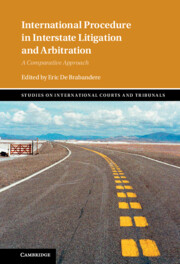Book contents
- International Procedure in Interstate Litigation and Arbitration
- Studies on International Courts and Tribunals
- International Procedure in Interstate Litigation and Arbitration
- Copyright page
- Contents
- Contributors
- Introduction
- Part I Pre-hearing and Selection and Appointment of Judges and Arbitrators
- 1 Registries and Secretariats of Interstate Dispute Settlement Authorities
- 2 Judicial Independence at International Courts and Tribunals
- 3 Designing for the Best Composition of International Courts
- 4 The Role of the Judge ad hoc in Interstate Litigation
- Part II Post-commencement Litigation Procedure and Strategy
- Part III Evidence and Witness
- Part IV Post-hearing and Effect of Decisions
- Index
4 - The Role of the Judge ad hoc in Interstate Litigation
Perspectives from the Law and Practice of the International Court of Justice
from Part I - Pre-hearing and Selection and Appointment of Judges and Arbitrators
Published online by Cambridge University Press: 18 November 2021
- International Procedure in Interstate Litigation and Arbitration
- Studies on International Courts and Tribunals
- International Procedure in Interstate Litigation and Arbitration
- Copyright page
- Contents
- Contributors
- Introduction
- Part I Pre-hearing and Selection and Appointment of Judges and Arbitrators
- 1 Registries and Secretariats of Interstate Dispute Settlement Authorities
- 2 Judicial Independence at International Courts and Tribunals
- 3 Designing for the Best Composition of International Courts
- 4 The Role of the Judge ad hoc in Interstate Litigation
- Part II Post-commencement Litigation Procedure and Strategy
- Part III Evidence and Witness
- Part IV Post-hearing and Effect of Decisions
- Index
Summary
The role of the judge ad hoc at the International Court of Justice (ICJ or Court) has historical origins in the practice of interstate arbitration tribunals in the 18th and 19th centuries. The drafters of the Statute of the Permanent Court of International Justice (PCIJ), after some debate, provided for party-appointed decision-makers when they designed the first permanent judicial body, and the drafters of the Statute of the International Court of Justice retained this feature, essentially unaltered. This phenomenon has generated occasional commentary about why the role of the judge ad hoc exists in the first place, given the importance of the impartiality and independence of the bench. This chapter aims to contribute to this body of scholarship by re-examining the rationales behind the role of the judge ad hoc, in light of empirical data about how often they are appointed, who they are, and what they do while serving on the bench. In transplanting the role of the judge ad hoc from interstate arbitration, the drafters of the PCIJ articulated a range of rationales that have been continuously reiterated over the last century by commentators and ICJ judges. The data, however, provide only limited support for the various rationales that have been articulated, with the result that the vision of the drafters of the PCIJ Statute does not entirely match the reality of today’s judges ad hoc. The data suggest that judges ad hoc appear to act as intermediaries between the Court and their appointing parties, but to a more limited extent than has commonly been thought. The notion that judges ad hoc help to ensure that the parties’ arguments are fully understood by the rest of the bench is, in particular, not entirely persuasive. Furthermore, while it is possible that judges ad hoc contribute to the confidence that disputing parties have in the ICJ as an institution, and thus the Court’s sociological legitimacy, this is yet to be proven on an empirical level (and falls beyond the scope of this chapter). The role of the judge ad hoc may be best understood as a historical anomaly that apparently still holds value for litigating parties, however limited or symbolic this value might be.
- Type
- Chapter
- Information
- International Procedure in Interstate Litigation and ArbitrationA Comparative Approach, pp. 113 - 138Publisher: Cambridge University PressPrint publication year: 2021

